BUS707 T2 2019: Structured Literature Review on Accounting Ethics
VerifiedAdded on 2022/12/30
|9
|2115
|55
Report
AI Summary
This structured literature review examines the field of accounting and auditing ethics, exploring its theoretical development, common and different themes, and managerial implications based on four academic articles. The review begins with an introduction to the topic, defining accounting and auditing ethics as a field of applied ethics and its significance in business. It then traces the historical development of the theory, highlighting key contributors and the evolution of ethical considerations in accounting practices. The core of the review identifies common themes across the selected articles, such as the importance of ethical responsibilities, the impact of ethics on brand image, and the influence of accounting education on ethical decision-making. It also contrasts different themes, including the focus on the nature of accounting practices, the role of business ethics literature, and the impact of accounting ethics in education and business. The review further discusses the managerial implications, emphasizing how understanding accounting ethics can improve ethical conduct, segregate business and accounting ethics, and enhance employee performance. The limitations of the articles are addressed, along with directions for future research. The conclusion reiterates the critical need for ethical codes of conduct to maintain financial integrity within business organizations.
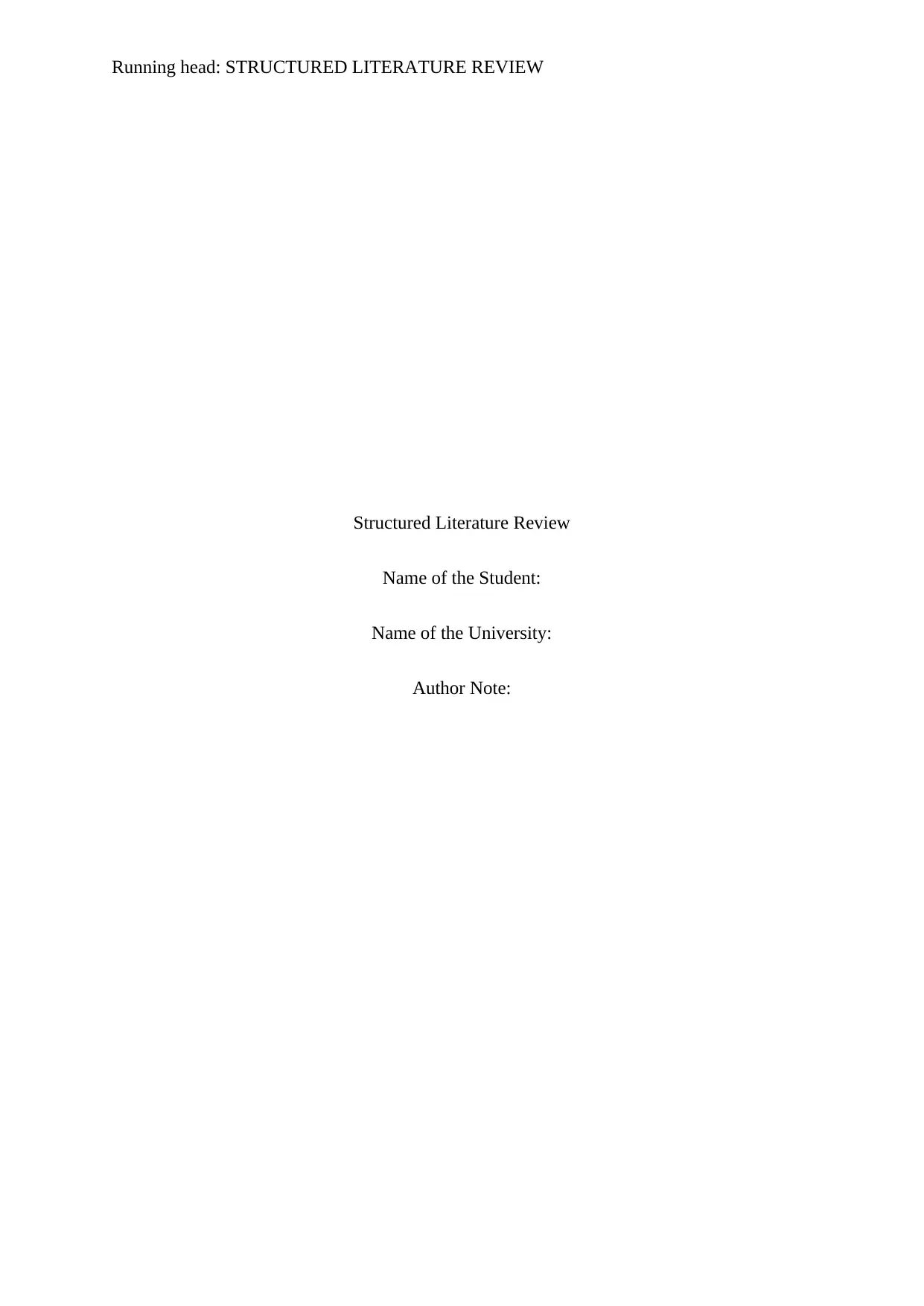
Running head: STRUCTURED LITERATURE REVIEW
Structured Literature Review
Name of the Student:
Name of the University:
Author Note:
Structured Literature Review
Name of the Student:
Name of the University:
Author Note:
Paraphrase This Document
Need a fresh take? Get an instant paraphrase of this document with our AI Paraphraser
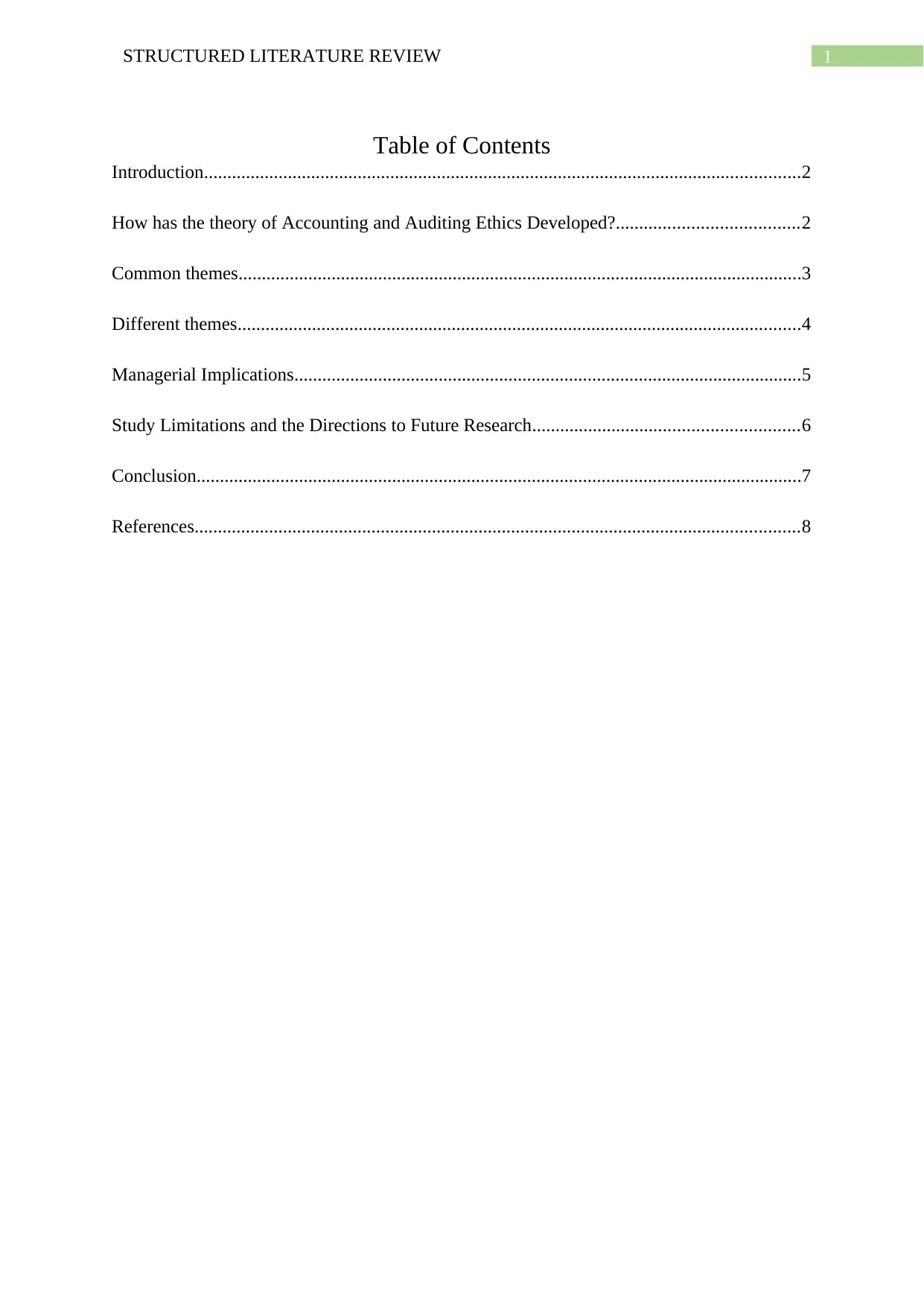
1STRUCTURED LITERATURE REVIEW
Table of Contents
Introduction................................................................................................................................2
How has the theory of Accounting and Auditing Ethics Developed?.......................................2
Common themes.........................................................................................................................3
Different themes.........................................................................................................................4
Managerial Implications.............................................................................................................5
Study Limitations and the Directions to Future Research.........................................................6
Conclusion..................................................................................................................................7
References..................................................................................................................................8
Table of Contents
Introduction................................................................................................................................2
How has the theory of Accounting and Auditing Ethics Developed?.......................................2
Common themes.........................................................................................................................3
Different themes.........................................................................................................................4
Managerial Implications.............................................................................................................5
Study Limitations and the Directions to Future Research.........................................................6
Conclusion..................................................................................................................................7
References..................................................................................................................................8
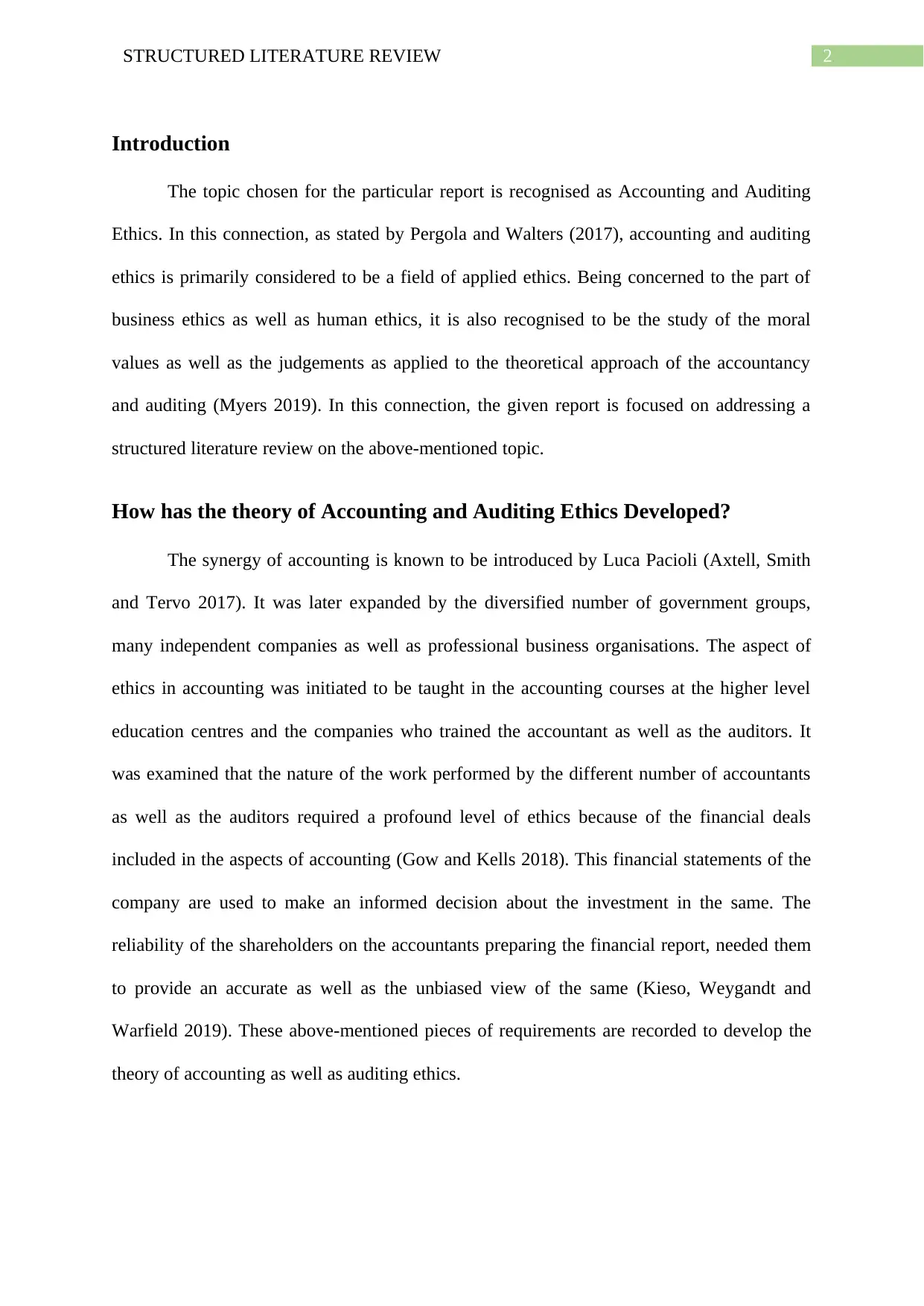
2STRUCTURED LITERATURE REVIEW
Introduction
The topic chosen for the particular report is recognised as Accounting and Auditing
Ethics. In this connection, as stated by Pergola and Walters (2017), accounting and auditing
ethics is primarily considered to be a field of applied ethics. Being concerned to the part of
business ethics as well as human ethics, it is also recognised to be the study of the moral
values as well as the judgements as applied to the theoretical approach of the accountancy
and auditing (Myers 2019). In this connection, the given report is focused on addressing a
structured literature review on the above-mentioned topic.
How has the theory of Accounting and Auditing Ethics Developed?
The synergy of accounting is known to be introduced by Luca Pacioli (Axtell, Smith
and Tervo 2017). It was later expanded by the diversified number of government groups,
many independent companies as well as professional business organisations. The aspect of
ethics in accounting was initiated to be taught in the accounting courses at the higher level
education centres and the companies who trained the accountant as well as the auditors. It
was examined that the nature of the work performed by the different number of accountants
as well as the auditors required a profound level of ethics because of the financial deals
included in the aspects of accounting (Gow and Kells 2018). This financial statements of the
company are used to make an informed decision about the investment in the same. The
reliability of the shareholders on the accountants preparing the financial report, needed them
to provide an accurate as well as the unbiased view of the same (Kieso, Weygandt and
Warfield 2019). These above-mentioned pieces of requirements are recorded to develop the
theory of accounting as well as auditing ethics.
Introduction
The topic chosen for the particular report is recognised as Accounting and Auditing
Ethics. In this connection, as stated by Pergola and Walters (2017), accounting and auditing
ethics is primarily considered to be a field of applied ethics. Being concerned to the part of
business ethics as well as human ethics, it is also recognised to be the study of the moral
values as well as the judgements as applied to the theoretical approach of the accountancy
and auditing (Myers 2019). In this connection, the given report is focused on addressing a
structured literature review on the above-mentioned topic.
How has the theory of Accounting and Auditing Ethics Developed?
The synergy of accounting is known to be introduced by Luca Pacioli (Axtell, Smith
and Tervo 2017). It was later expanded by the diversified number of government groups,
many independent companies as well as professional business organisations. The aspect of
ethics in accounting was initiated to be taught in the accounting courses at the higher level
education centres and the companies who trained the accountant as well as the auditors. It
was examined that the nature of the work performed by the different number of accountants
as well as the auditors required a profound level of ethics because of the financial deals
included in the aspects of accounting (Gow and Kells 2018). This financial statements of the
company are used to make an informed decision about the investment in the same. The
reliability of the shareholders on the accountants preparing the financial report, needed them
to provide an accurate as well as the unbiased view of the same (Kieso, Weygandt and
Warfield 2019). These above-mentioned pieces of requirements are recorded to develop the
theory of accounting as well as auditing ethics.
⊘ This is a preview!⊘
Do you want full access?
Subscribe today to unlock all pages.

Trusted by 1+ million students worldwide
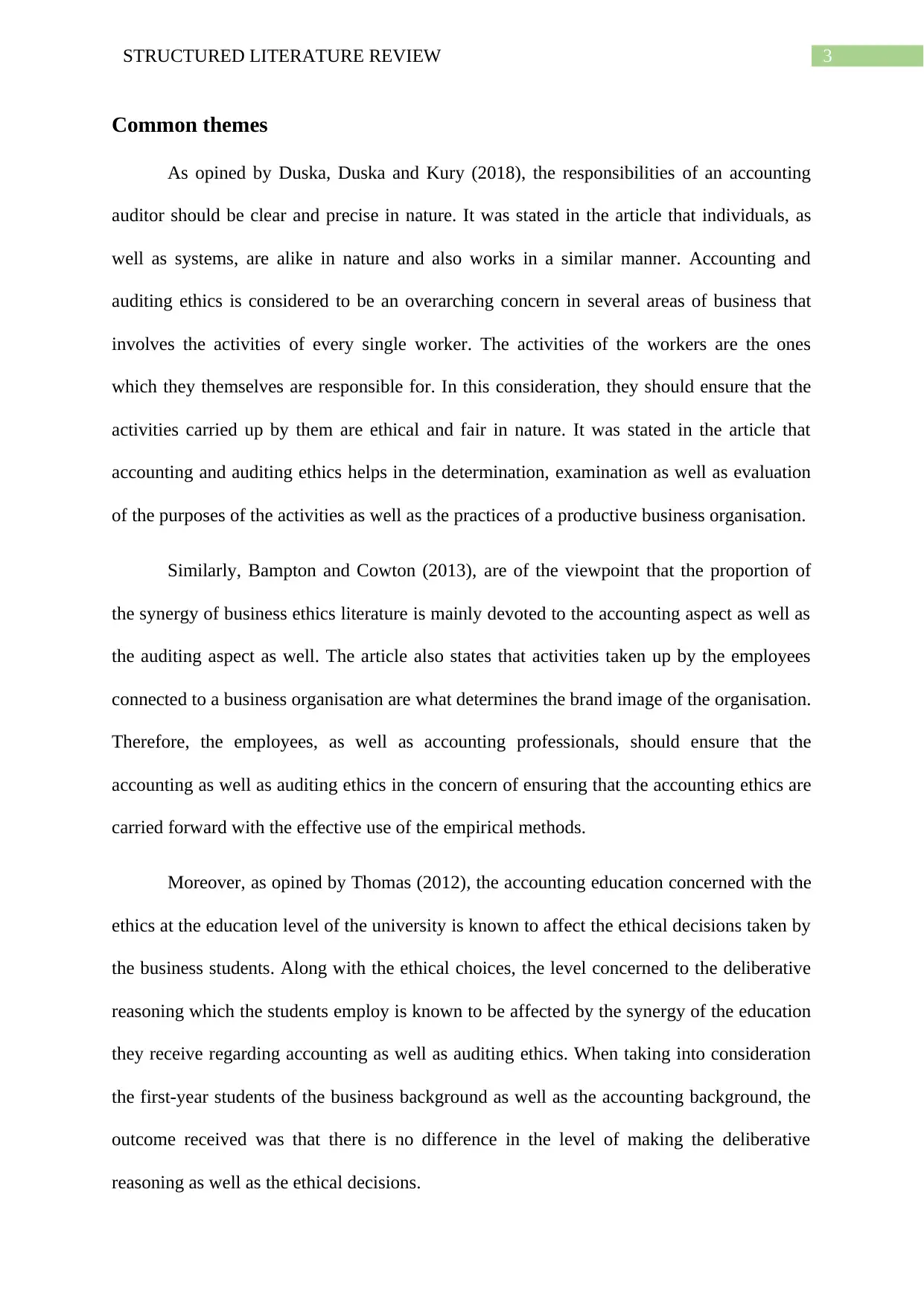
3STRUCTURED LITERATURE REVIEW
Common themes
As opined by Duska, Duska and Kury (2018), the responsibilities of an accounting
auditor should be clear and precise in nature. It was stated in the article that individuals, as
well as systems, are alike in nature and also works in a similar manner. Accounting and
auditing ethics is considered to be an overarching concern in several areas of business that
involves the activities of every single worker. The activities of the workers are the ones
which they themselves are responsible for. In this consideration, they should ensure that the
activities carried up by them are ethical and fair in nature. It was stated in the article that
accounting and auditing ethics helps in the determination, examination as well as evaluation
of the purposes of the activities as well as the practices of a productive business organisation.
Similarly, Bampton and Cowton (2013), are of the viewpoint that the proportion of
the synergy of business ethics literature is mainly devoted to the accounting aspect as well as
the auditing aspect as well. The article also states that activities taken up by the employees
connected to a business organisation are what determines the brand image of the organisation.
Therefore, the employees, as well as accounting professionals, should ensure that the
accounting as well as auditing ethics in the concern of ensuring that the accounting ethics are
carried forward with the effective use of the empirical methods.
Moreover, as opined by Thomas (2012), the accounting education concerned with the
ethics at the education level of the university is known to affect the ethical decisions taken by
the business students. Along with the ethical choices, the level concerned to the deliberative
reasoning which the students employ is known to be affected by the synergy of the education
they receive regarding accounting as well as auditing ethics. When taking into consideration
the first-year students of the business background as well as the accounting background, the
outcome received was that there is no difference in the level of making the deliberative
reasoning as well as the ethical decisions.
Common themes
As opined by Duska, Duska and Kury (2018), the responsibilities of an accounting
auditor should be clear and precise in nature. It was stated in the article that individuals, as
well as systems, are alike in nature and also works in a similar manner. Accounting and
auditing ethics is considered to be an overarching concern in several areas of business that
involves the activities of every single worker. The activities of the workers are the ones
which they themselves are responsible for. In this consideration, they should ensure that the
activities carried up by them are ethical and fair in nature. It was stated in the article that
accounting and auditing ethics helps in the determination, examination as well as evaluation
of the purposes of the activities as well as the practices of a productive business organisation.
Similarly, Bampton and Cowton (2013), are of the viewpoint that the proportion of
the synergy of business ethics literature is mainly devoted to the accounting aspect as well as
the auditing aspect as well. The article also states that activities taken up by the employees
connected to a business organisation are what determines the brand image of the organisation.
Therefore, the employees, as well as accounting professionals, should ensure that the
accounting as well as auditing ethics in the concern of ensuring that the accounting ethics are
carried forward with the effective use of the empirical methods.
Moreover, as opined by Thomas (2012), the accounting education concerned with the
ethics at the education level of the university is known to affect the ethical decisions taken by
the business students. Along with the ethical choices, the level concerned to the deliberative
reasoning which the students employ is known to be affected by the synergy of the education
they receive regarding accounting as well as auditing ethics. When taking into consideration
the first-year students of the business background as well as the accounting background, the
outcome received was that there is no difference in the level of making the deliberative
reasoning as well as the ethical decisions.
Paraphrase This Document
Need a fresh take? Get an instant paraphrase of this document with our AI Paraphraser
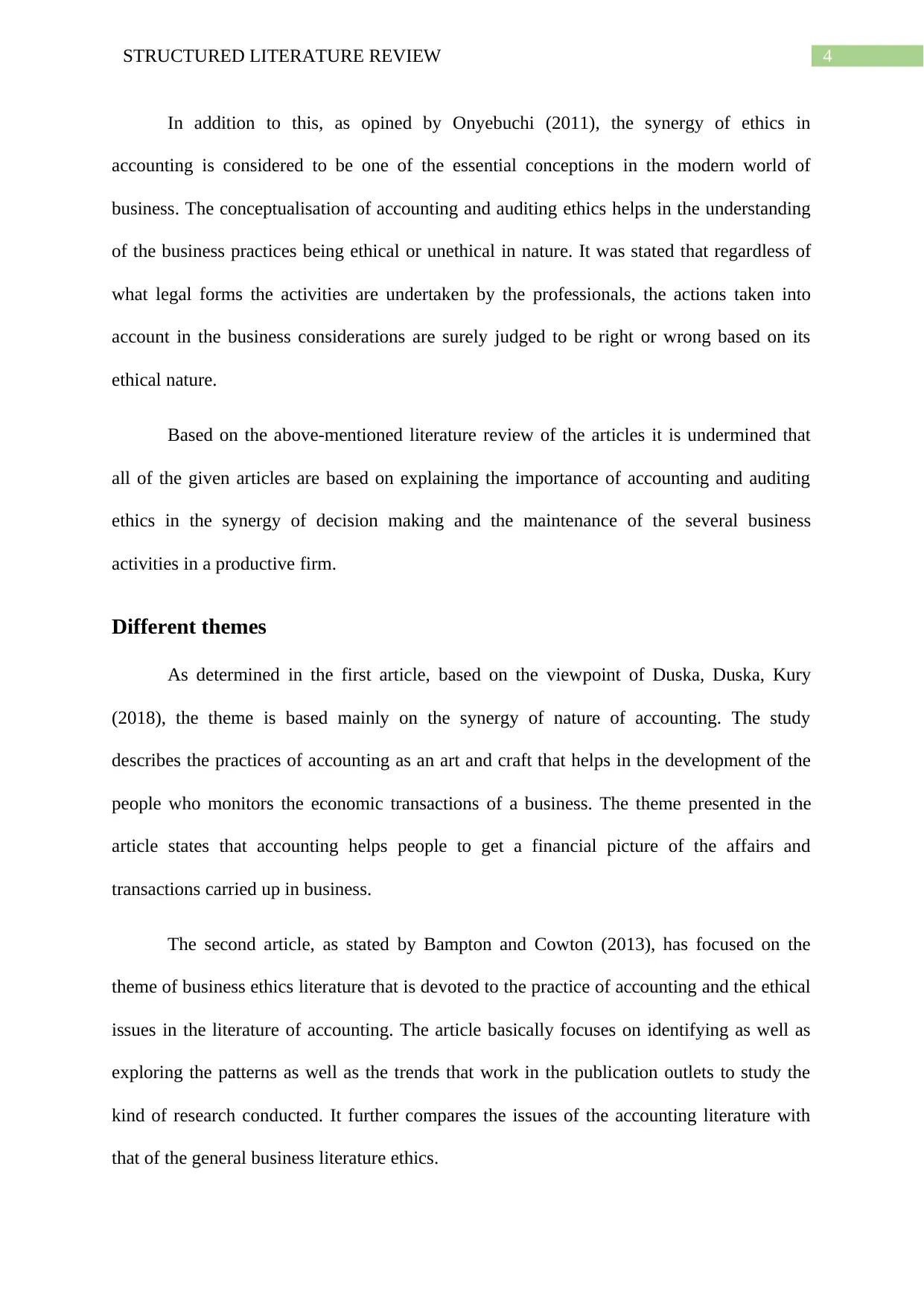
4STRUCTURED LITERATURE REVIEW
In addition to this, as opined by Onyebuchi (2011), the synergy of ethics in
accounting is considered to be one of the essential conceptions in the modern world of
business. The conceptualisation of accounting and auditing ethics helps in the understanding
of the business practices being ethical or unethical in nature. It was stated that regardless of
what legal forms the activities are undertaken by the professionals, the actions taken into
account in the business considerations are surely judged to be right or wrong based on its
ethical nature.
Based on the above-mentioned literature review of the articles it is undermined that
all of the given articles are based on explaining the importance of accounting and auditing
ethics in the synergy of decision making and the maintenance of the several business
activities in a productive firm.
Different themes
As determined in the first article, based on the viewpoint of Duska, Duska, Kury
(2018), the theme is based mainly on the synergy of nature of accounting. The study
describes the practices of accounting as an art and craft that helps in the development of the
people who monitors the economic transactions of a business. The theme presented in the
article states that accounting helps people to get a financial picture of the affairs and
transactions carried up in business.
The second article, as stated by Bampton and Cowton (2013), has focused on the
theme of business ethics literature that is devoted to the practice of accounting and the ethical
issues in the literature of accounting. The article basically focuses on identifying as well as
exploring the patterns as well as the trends that work in the publication outlets to study the
kind of research conducted. It further compares the issues of the accounting literature with
that of the general business literature ethics.
In addition to this, as opined by Onyebuchi (2011), the synergy of ethics in
accounting is considered to be one of the essential conceptions in the modern world of
business. The conceptualisation of accounting and auditing ethics helps in the understanding
of the business practices being ethical or unethical in nature. It was stated that regardless of
what legal forms the activities are undertaken by the professionals, the actions taken into
account in the business considerations are surely judged to be right or wrong based on its
ethical nature.
Based on the above-mentioned literature review of the articles it is undermined that
all of the given articles are based on explaining the importance of accounting and auditing
ethics in the synergy of decision making and the maintenance of the several business
activities in a productive firm.
Different themes
As determined in the first article, based on the viewpoint of Duska, Duska, Kury
(2018), the theme is based mainly on the synergy of nature of accounting. The study
describes the practices of accounting as an art and craft that helps in the development of the
people who monitors the economic transactions of a business. The theme presented in the
article states that accounting helps people to get a financial picture of the affairs and
transactions carried up in business.
The second article, as stated by Bampton and Cowton (2013), has focused on the
theme of business ethics literature that is devoted to the practice of accounting and the ethical
issues in the literature of accounting. The article basically focuses on identifying as well as
exploring the patterns as well as the trends that work in the publication outlets to study the
kind of research conducted. It further compares the issues of the accounting literature with
that of the general business literature ethics.
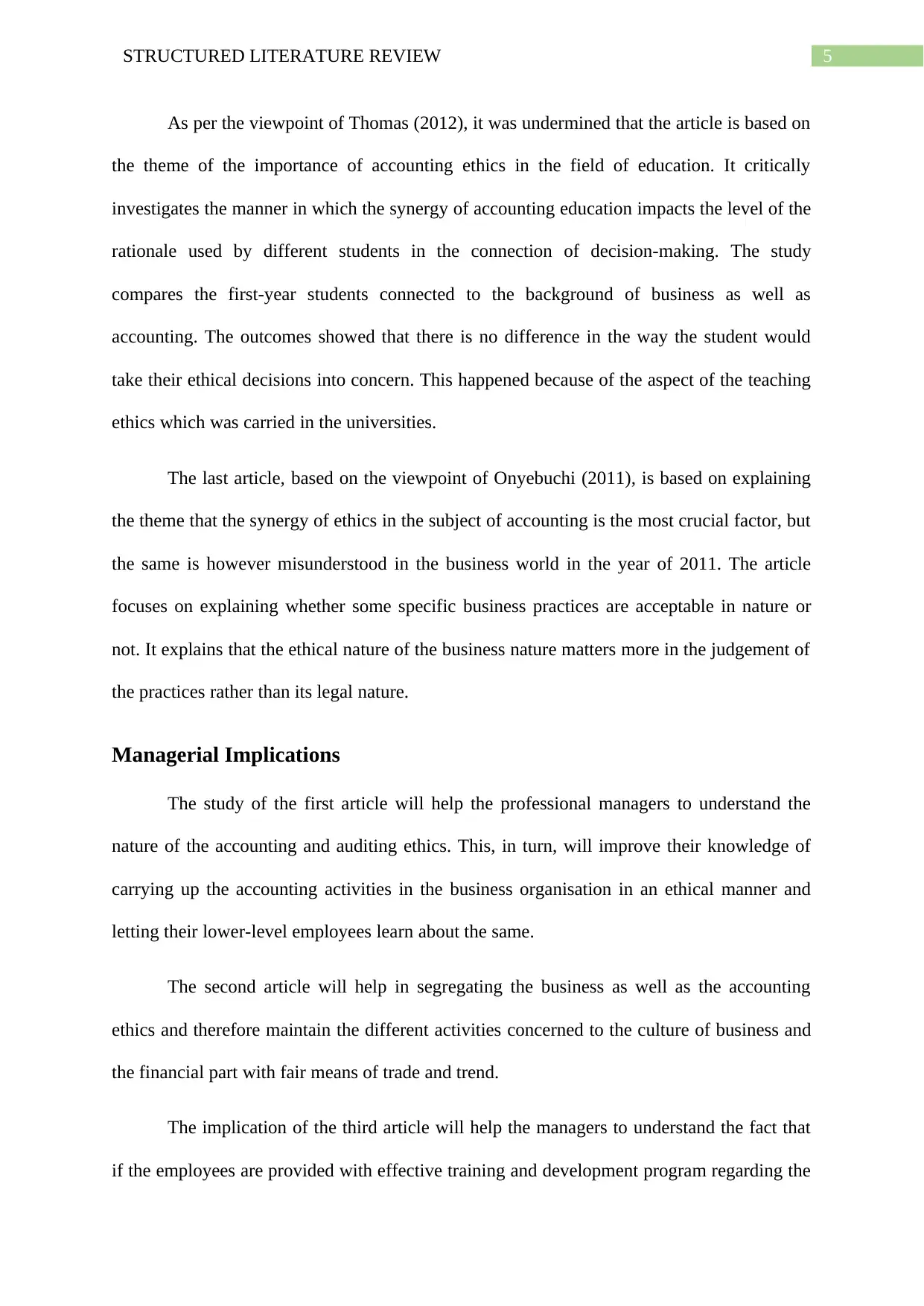
5STRUCTURED LITERATURE REVIEW
As per the viewpoint of Thomas (2012), it was undermined that the article is based on
the theme of the importance of accounting ethics in the field of education. It critically
investigates the manner in which the synergy of accounting education impacts the level of the
rationale used by different students in the connection of decision-making. The study
compares the first-year students connected to the background of business as well as
accounting. The outcomes showed that there is no difference in the way the student would
take their ethical decisions into concern. This happened because of the aspect of the teaching
ethics which was carried in the universities.
The last article, based on the viewpoint of Onyebuchi (2011), is based on explaining
the theme that the synergy of ethics in the subject of accounting is the most crucial factor, but
the same is however misunderstood in the business world in the year of 2011. The article
focuses on explaining whether some specific business practices are acceptable in nature or
not. It explains that the ethical nature of the business nature matters more in the judgement of
the practices rather than its legal nature.
Managerial Implications
The study of the first article will help the professional managers to understand the
nature of the accounting and auditing ethics. This, in turn, will improve their knowledge of
carrying up the accounting activities in the business organisation in an ethical manner and
letting their lower-level employees learn about the same.
The second article will help in segregating the business as well as the accounting
ethics and therefore maintain the different activities concerned to the culture of business and
the financial part with fair means of trade and trend.
The implication of the third article will help the managers to understand the fact that
if the employees are provided with effective training and development program regarding the
As per the viewpoint of Thomas (2012), it was undermined that the article is based on
the theme of the importance of accounting ethics in the field of education. It critically
investigates the manner in which the synergy of accounting education impacts the level of the
rationale used by different students in the connection of decision-making. The study
compares the first-year students connected to the background of business as well as
accounting. The outcomes showed that there is no difference in the way the student would
take their ethical decisions into concern. This happened because of the aspect of the teaching
ethics which was carried in the universities.
The last article, based on the viewpoint of Onyebuchi (2011), is based on explaining
the theme that the synergy of ethics in the subject of accounting is the most crucial factor, but
the same is however misunderstood in the business world in the year of 2011. The article
focuses on explaining whether some specific business practices are acceptable in nature or
not. It explains that the ethical nature of the business nature matters more in the judgement of
the practices rather than its legal nature.
Managerial Implications
The study of the first article will help the professional managers to understand the
nature of the accounting and auditing ethics. This, in turn, will improve their knowledge of
carrying up the accounting activities in the business organisation in an ethical manner and
letting their lower-level employees learn about the same.
The second article will help in segregating the business as well as the accounting
ethics and therefore maintain the different activities concerned to the culture of business and
the financial part with fair means of trade and trend.
The implication of the third article will help the managers to understand the fact that
if the employees are provided with effective training and development program regarding the
⊘ This is a preview!⊘
Do you want full access?
Subscribe today to unlock all pages.

Trusted by 1+ million students worldwide
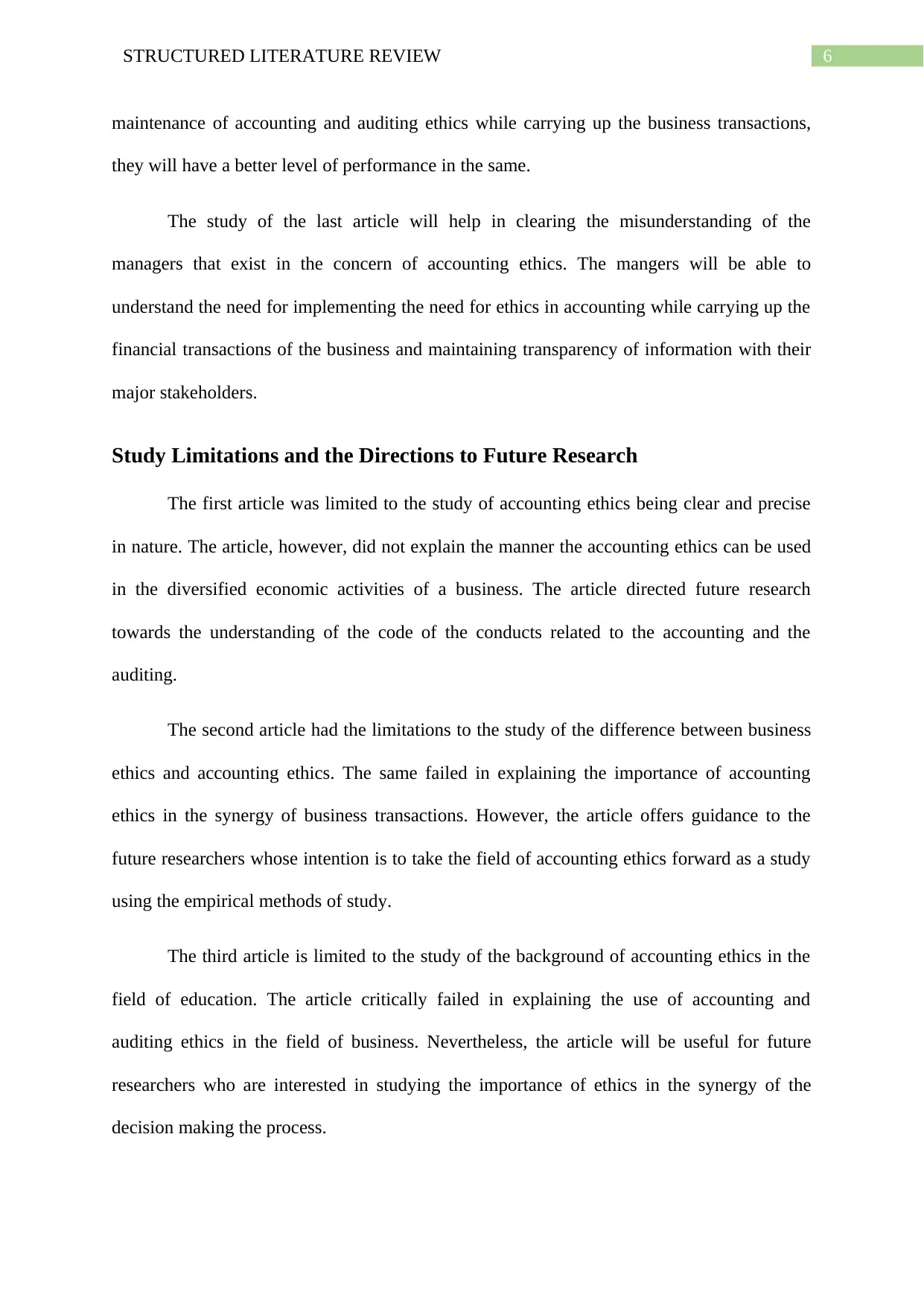
6STRUCTURED LITERATURE REVIEW
maintenance of accounting and auditing ethics while carrying up the business transactions,
they will have a better level of performance in the same.
The study of the last article will help in clearing the misunderstanding of the
managers that exist in the concern of accounting ethics. The mangers will be able to
understand the need for implementing the need for ethics in accounting while carrying up the
financial transactions of the business and maintaining transparency of information with their
major stakeholders.
Study Limitations and the Directions to Future Research
The first article was limited to the study of accounting ethics being clear and precise
in nature. The article, however, did not explain the manner the accounting ethics can be used
in the diversified economic activities of a business. The article directed future research
towards the understanding of the code of the conducts related to the accounting and the
auditing.
The second article had the limitations to the study of the difference between business
ethics and accounting ethics. The same failed in explaining the importance of accounting
ethics in the synergy of business transactions. However, the article offers guidance to the
future researchers whose intention is to take the field of accounting ethics forward as a study
using the empirical methods of study.
The third article is limited to the study of the background of accounting ethics in the
field of education. The article critically failed in explaining the use of accounting and
auditing ethics in the field of business. Nevertheless, the article will be useful for future
researchers who are interested in studying the importance of ethics in the synergy of the
decision making the process.
maintenance of accounting and auditing ethics while carrying up the business transactions,
they will have a better level of performance in the same.
The study of the last article will help in clearing the misunderstanding of the
managers that exist in the concern of accounting ethics. The mangers will be able to
understand the need for implementing the need for ethics in accounting while carrying up the
financial transactions of the business and maintaining transparency of information with their
major stakeholders.
Study Limitations and the Directions to Future Research
The first article was limited to the study of accounting ethics being clear and precise
in nature. The article, however, did not explain the manner the accounting ethics can be used
in the diversified economic activities of a business. The article directed future research
towards the understanding of the code of the conducts related to the accounting and the
auditing.
The second article had the limitations to the study of the difference between business
ethics and accounting ethics. The same failed in explaining the importance of accounting
ethics in the synergy of business transactions. However, the article offers guidance to the
future researchers whose intention is to take the field of accounting ethics forward as a study
using the empirical methods of study.
The third article is limited to the study of the background of accounting ethics in the
field of education. The article critically failed in explaining the use of accounting and
auditing ethics in the field of business. Nevertheless, the article will be useful for future
researchers who are interested in studying the importance of ethics in the synergy of the
decision making the process.
Paraphrase This Document
Need a fresh take? Get an instant paraphrase of this document with our AI Paraphraser
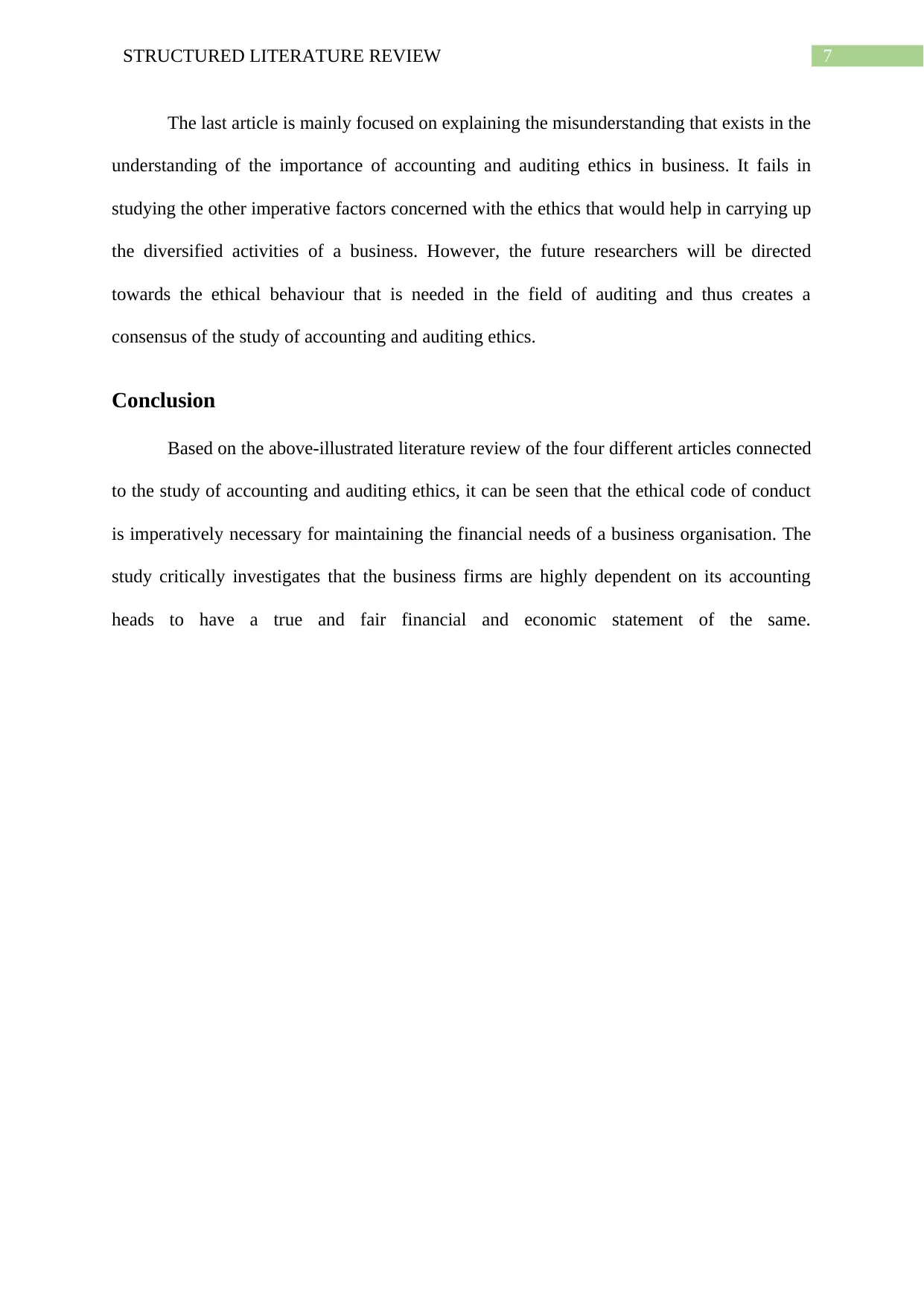
7STRUCTURED LITERATURE REVIEW
The last article is mainly focused on explaining the misunderstanding that exists in the
understanding of the importance of accounting and auditing ethics in business. It fails in
studying the other imperative factors concerned with the ethics that would help in carrying up
the diversified activities of a business. However, the future researchers will be directed
towards the ethical behaviour that is needed in the field of auditing and thus creates a
consensus of the study of accounting and auditing ethics.
Conclusion
Based on the above-illustrated literature review of the four different articles connected
to the study of accounting and auditing ethics, it can be seen that the ethical code of conduct
is imperatively necessary for maintaining the financial needs of a business organisation. The
study critically investigates that the business firms are highly dependent on its accounting
heads to have a true and fair financial and economic statement of the same.
The last article is mainly focused on explaining the misunderstanding that exists in the
understanding of the importance of accounting and auditing ethics in business. It fails in
studying the other imperative factors concerned with the ethics that would help in carrying up
the diversified activities of a business. However, the future researchers will be directed
towards the ethical behaviour that is needed in the field of auditing and thus creates a
consensus of the study of accounting and auditing ethics.
Conclusion
Based on the above-illustrated literature review of the four different articles connected
to the study of accounting and auditing ethics, it can be seen that the ethical code of conduct
is imperatively necessary for maintaining the financial needs of a business organisation. The
study critically investigates that the business firms are highly dependent on its accounting
heads to have a true and fair financial and economic statement of the same.
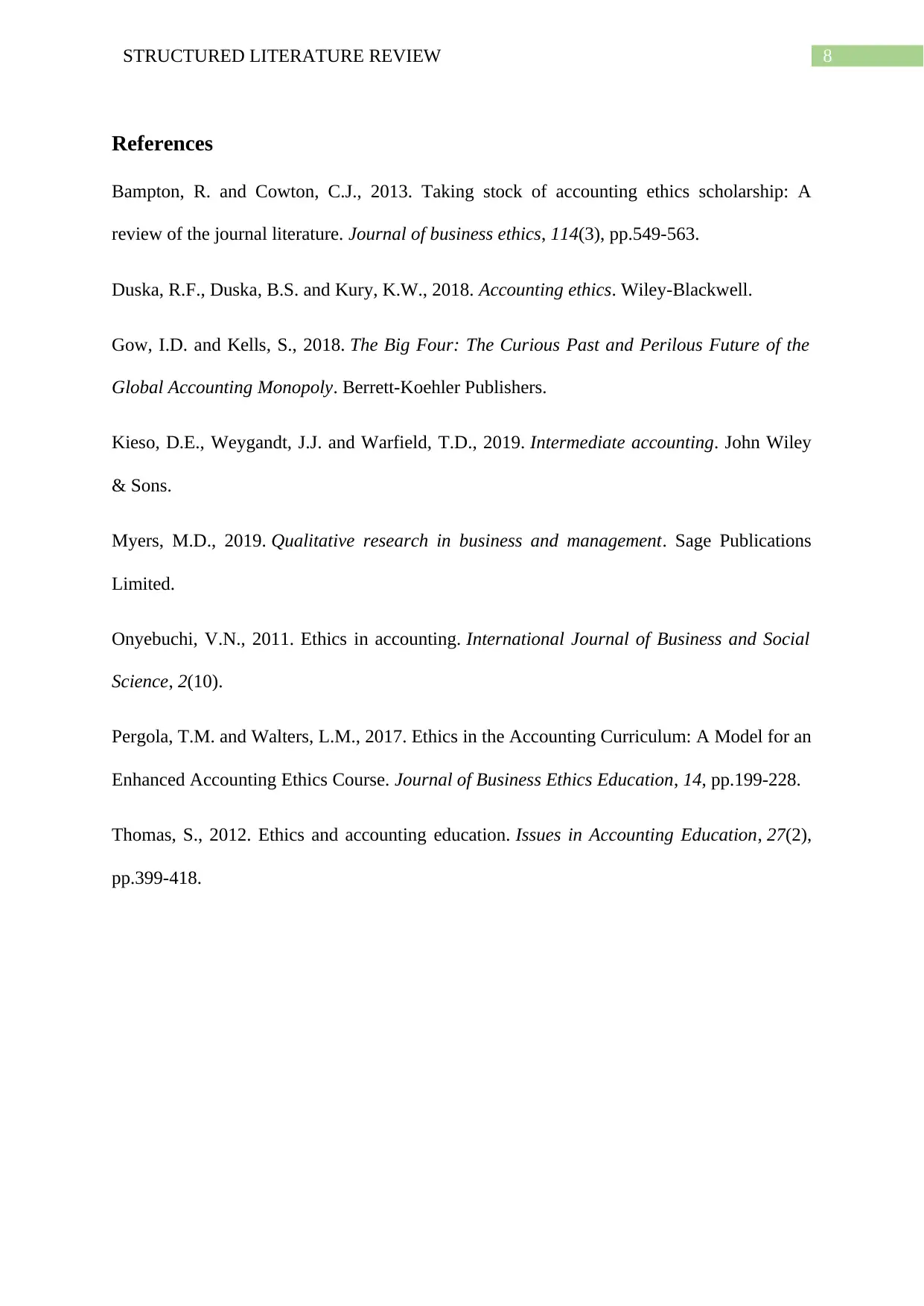
8STRUCTURED LITERATURE REVIEW
References
Bampton, R. and Cowton, C.J., 2013. Taking stock of accounting ethics scholarship: A
review of the journal literature. Journal of business ethics, 114(3), pp.549-563.
Duska, R.F., Duska, B.S. and Kury, K.W., 2018. Accounting ethics. Wiley-Blackwell.
Gow, I.D. and Kells, S., 2018. The Big Four: The Curious Past and Perilous Future of the
Global Accounting Monopoly. Berrett-Koehler Publishers.
Kieso, D.E., Weygandt, J.J. and Warfield, T.D., 2019. Intermediate accounting. John Wiley
& Sons.
Myers, M.D., 2019. Qualitative research in business and management. Sage Publications
Limited.
Onyebuchi, V.N., 2011. Ethics in accounting. International Journal of Business and Social
Science, 2(10).
Pergola, T.M. and Walters, L.M., 2017. Ethics in the Accounting Curriculum: A Model for an
Enhanced Accounting Ethics Course. Journal of Business Ethics Education, 14, pp.199-228.
Thomas, S., 2012. Ethics and accounting education. Issues in Accounting Education, 27(2),
pp.399-418.
References
Bampton, R. and Cowton, C.J., 2013. Taking stock of accounting ethics scholarship: A
review of the journal literature. Journal of business ethics, 114(3), pp.549-563.
Duska, R.F., Duska, B.S. and Kury, K.W., 2018. Accounting ethics. Wiley-Blackwell.
Gow, I.D. and Kells, S., 2018. The Big Four: The Curious Past and Perilous Future of the
Global Accounting Monopoly. Berrett-Koehler Publishers.
Kieso, D.E., Weygandt, J.J. and Warfield, T.D., 2019. Intermediate accounting. John Wiley
& Sons.
Myers, M.D., 2019. Qualitative research in business and management. Sage Publications
Limited.
Onyebuchi, V.N., 2011. Ethics in accounting. International Journal of Business and Social
Science, 2(10).
Pergola, T.M. and Walters, L.M., 2017. Ethics in the Accounting Curriculum: A Model for an
Enhanced Accounting Ethics Course. Journal of Business Ethics Education, 14, pp.199-228.
Thomas, S., 2012. Ethics and accounting education. Issues in Accounting Education, 27(2),
pp.399-418.
⊘ This is a preview!⊘
Do you want full access?
Subscribe today to unlock all pages.

Trusted by 1+ million students worldwide
1 out of 9
Related Documents
Your All-in-One AI-Powered Toolkit for Academic Success.
+13062052269
info@desklib.com
Available 24*7 on WhatsApp / Email
![[object Object]](/_next/static/media/star-bottom.7253800d.svg)
Unlock your academic potential
Copyright © 2020–2026 A2Z Services. All Rights Reserved. Developed and managed by ZUCOL.




